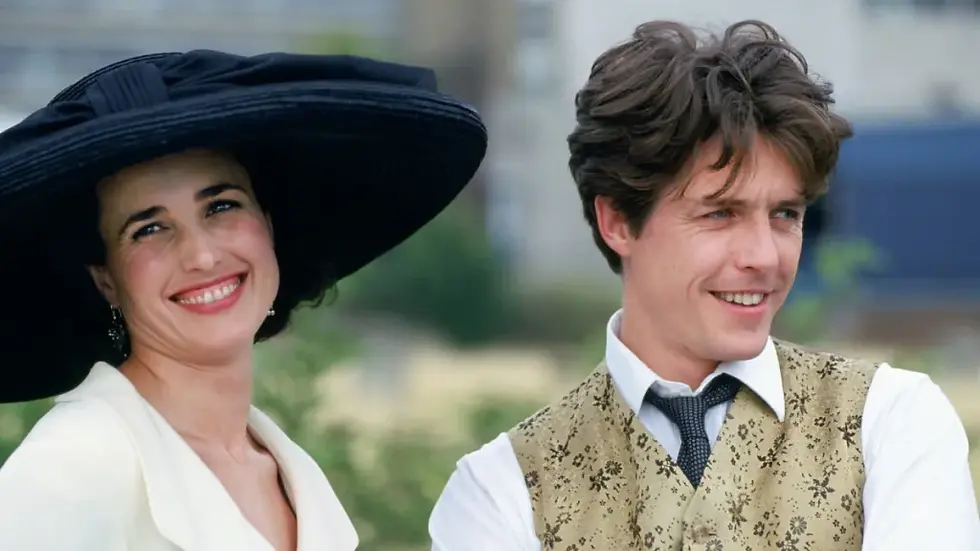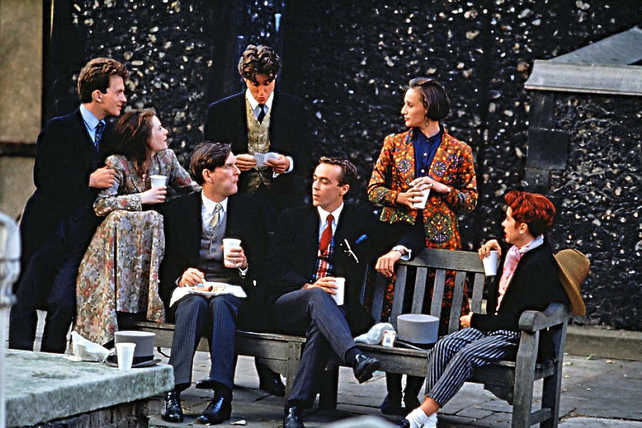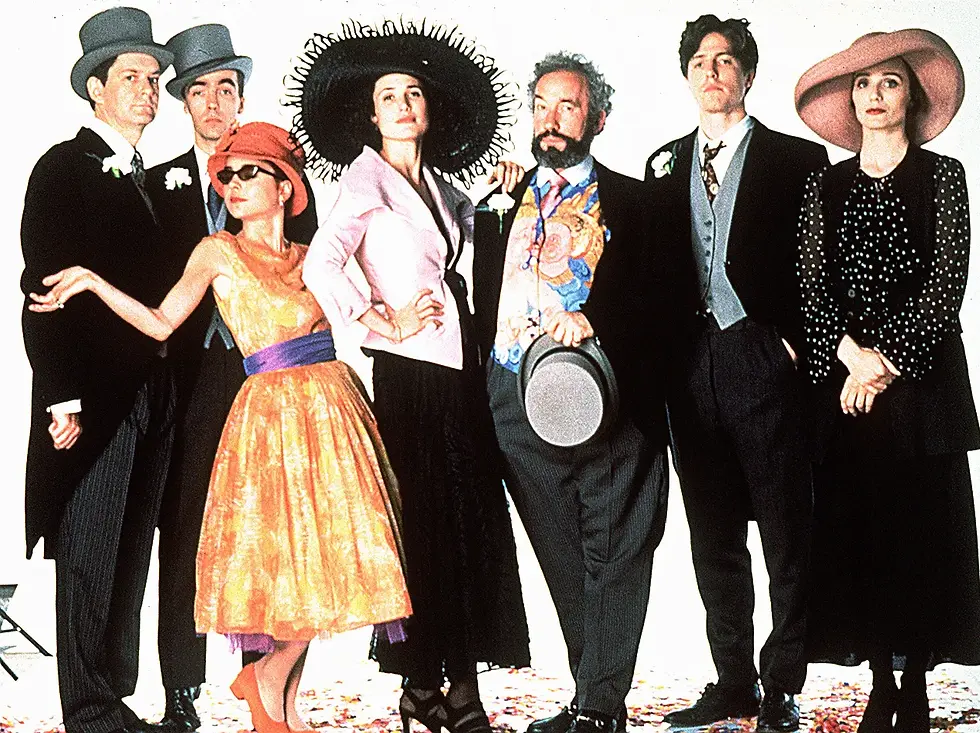Four Weddings and a Funeral (1994)
- Soames Inscker

- Aug 3, 2025
- 4 min read

Directed by Mike Newell and written by Richard Curtis, Four Weddings and a Funeral is a quintessential British romantic comedy that became an unexpected global success and a defining film of the 1990s. With its charming ensemble cast, witty script, and heartfelt exploration of love and friendship, the movie helped reinvigorate the romantic comedy genre while introducing audiences worldwide to the quintessentially British blend of humour and sentimentality.
Plot Overview
The story follows Charles (Hugh Grant), a shy, witty, and perpetually late bachelor who spends much of his life attending weddings with his close-knit group of friends. These friends include:
Fiona (Kristin Scott Thomas), elegant and world-weary
Tom (James Fleet), sweet but socially awkward
Matthew (John Hannah), sensitive and thoughtful
Scarlett (Charlotte Coleman), Charles’s eccentric flatmate
Across the film’s structure of four weddings and one funeral, Charles repeatedly encounters Carrie (Andie MacDowell), an American woman who quickly captures his heart. Their interactions are marked by bad timing, near-misses, and romantic complications, as Carrie ultimately marries another man despite her clear connection with Charles.
The narrative balances humour and poignancy, culminating in a heartfelt funeral scene that deepens the film’s emotional resonance and reaffirms its themes of love, loss, and the fleeting nature of life. The final act brings the story full circle, with Charles finally declaring his love to Carrie in an unconventional, rain-soaked proposal that rejects traditional marriage in favour of authentic companionship.
Performances

Hugh Grant as Charles
Hugh Grant’s performance as Charles made him an international star. His self-effacing charm, awkward stammer, and effortless comedic timing became hallmarks of his romantic comedy persona. Grant imbues Charles with vulnerability and likability, ensuring that audiences root for him despite his indecisiveness.
Andie MacDowell as Carrie
MacDowell’s Carrie is enigmatic and alluring, though some critics felt her performance was subdued compared to the energy of the supporting cast. Nevertheless, her chemistry with Grant anchors the romantic core of the film.
Supporting Cast
The ensemble cast delivers some of the film’s most memorable moments:
Kristin Scott Thomas as Fiona brings understated poignancy, especially in her unrequited love for Charles.
John Hannah as Matthew delivers the film’s emotional high point with his moving funeral eulogy, reading W.H. Auden’s poem “Funeral Blues.”
Simon Callow as Gareth provides exuberant comic energy and emotional warmth, particularly in his relationship with Matthew.
Charlotte Coleman as Scarlett adds eccentric charm and levity.
The strength of the supporting cast is key to the film’s success, creating a believable, endearing circle of friends.
Direction and Screenplay
Mike Newell’s direction is light and unintrusive, allowing the witty dialogue and character interactions to shine. He maintains a balance between humour and heartfelt emotion, ensuring the tonal shifts—especially from comedic weddings to the central funeral—feel organic.
Richard Curtis’s screenplay is sharp, self-aware, and quintessentially British in its humor. His writing revels in awkward social encounters, dry wit, and tender reflections on love. The script’s structure—anchored by the progression of weddings and the single funeral—gives the narrative rhythm and a sense of inevitability that keeps the audience engaged.
Themes and Analysis
Four Weddings and a Funeral explores several universal themes:
Love in All Its Forms – From passionate romantic love to deep friendship and unrequited affection, the film portrays the many shapes love can take.
The Passage of Time and Life’s Milestones – Weddings and funerals mark turning points, highlighting how relationships and friendships evolve over time.
Friendship as Chosen Family – Charles and his friends serve as each other’s emotional anchor, reminding viewers that love and companionship extend beyond romance.
The Imperfection of Love – By rejecting a perfect, fairy-tale romance, the film celebrates the messy, unpredictable nature of human relationships.
Cinematography and Music
The cinematography by Michael Coulter captures the English countryside and London locations with warmth and charm, creating an inviting and timeless visual palette. The wedding scenes are filled with light and colour, while the funeral sequence is appropriately somber and subdued.
The soundtrack enhances the film’s romantic and emotional beats, most notably Wet Wet Wet’s cover of “Love Is All Around,” which became a chart-topping hit and a cultural touchstone. The music underscores the film’s blend of humor and sentiment without overwhelming its quieter moments.
Critical and Commercial Reception
Upon release, Four Weddings and a Funeral was a critical and box-office triumph. Produced on a modest budget, it grossed over $245 million worldwide, becoming the highest-grossing British film in history at the time.
The film earned two Academy Award nominations:
Best Picture
Best Original Screenplay for Richard Curtis
Hugh Grant won a Golden Globe for Best Actor, solidifying his place as a leading man in romantic comedies. The film’s success also helped pave the way for a wave of British rom-coms, including Notting Hill (1999) and Love Actually (2003), both penned by Curtis.
Legacy and Cultural Impact

Four Weddings and a Funeral left a lasting legacy in the romantic comedy genre:
It cemented Hugh Grant as the quintessential rom-com lead.
It popularised a distinctly British style of romantic comedy that combined wit, self-deprecation, and heartfelt emotion.
Its blend of ensemble storytelling, humour, and genuine poignancy influenced later rom-coms internationally.
The film’s funeral sequence, featuring “Funeral Blues,” became one of the most memorable depictions of grief in a romantic comedy, showing that the genre can embrace profound emotional depth.
Conclusion
Four Weddings and a Funeral is a charming, witty, and surprisingly touching romantic comedy that transcends its genre through warmth, intelligence, and emotional honesty. It captures the humour and heartbreak of love and friendship with a timeless appeal, earning its status as one of the defining rom-coms of the 1990s.





